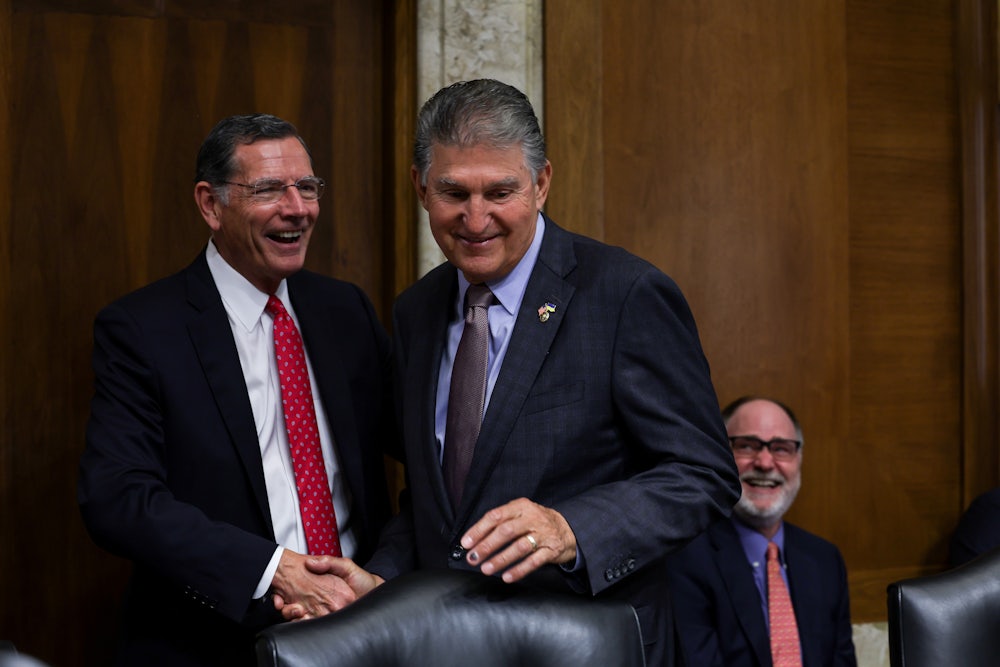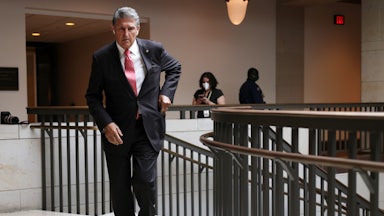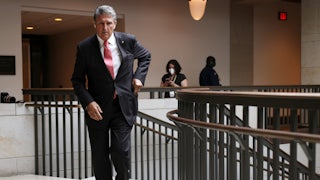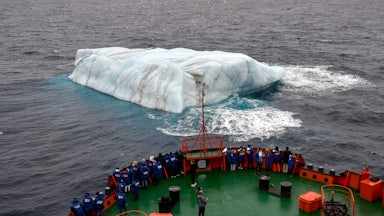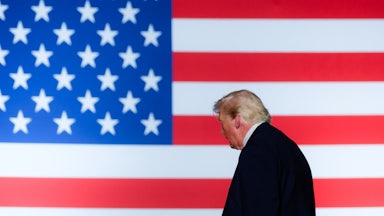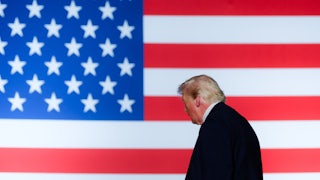Joe Manchin’s last-minute support for hundreds of billions of dollars in climate programs this week came as something of a surprise. Manchin has repeatedly killed climate proposals over the past year in party negotiations—most recently only weeks ago, when it seemed like he’d walked away from climate spending talks for good.
One of the reasons this turnaround has shocked so many is that, after Manchin appeared to kill climate spending earlier this month, the mainstream media was happy to excuse his behavior by scapegoating voters. This nightmare was our own fault for putting “a higher premium on immediate issues, such as inflation and the economy,” The New York Times intoned in a subhead, “giving politicians a pass on global warming.” When Democrats’ climate plans were in free fall, we kept hearing that the collapse of federal climate policy was somehow due to public opinion. Americans, according to this narrative, couldn’t be bothered over the climate crisis when we have more pressing “kitchen table” concerns.
Elites love stories that blame the public for elite failings—why wouldn’t they? But this one is so wrong that perhaps even Joe Manchin, a coal baron, realizes it. While we don’t know yet precisely how this deal unfolded, it’s pretty clear that Manchin is doing the politically smart thing: supporting significant climate measures, increasing corporate taxes, closing the private equity industry’s tax loopholes—and calling the whole package the Inflation Reduction Act of 2022.
Climate action enjoys broad support. Indeed, some climate policies are supported by huge majorities, including Republican voters. A large majority (58 percent) believes the federal government is doing too little to address the problem. As U.C. Santa Barbara political scientist Matto Mildenberger has been pointing out on Twitter, the public favors climate action and rewards it. Furthermore, while Manchin’s West Virginia constituents are more conservative than the national population, polling shows a clear majority of the state’s voters support aggressive clean energy initiatives, and many coal miners supported Build Back Better due to its funding for treatment of black lung disease. So the more plausible explanation for Manchin originally blocking climate action wasn’t because of voters but because he’s a coal baron (coal mine owners opposed Build Back Better). His most recent move—supporting climate legislation and pitching it as an anti-inflation measure—is far closer to a majoritarian position.
Mildenberger’s research supports his recent Twitter contentions. In a 2017 study authored with Yale University’s Anthony Leiserowitz, he challenged the conventional assumption that voters, during tough times, place short-term economic needs over long-term climate solutions. Leiserowitz and Mildenberger found little evidence that this was the case. The idea of a trade-off between economic and climate concerns was a myth (perhaps stoked by elites with vested interests in addressing neither problem).
While voters may not rank climate as highly as the economy among a list of concerns, Mildenberger doesn’t think that’s the most important metric. Asking about where climate lands in a ranked list, Mildenberger notes, obscures how popular climate policy can be when it is paired with improvements to working-class people’s lives, like affordable housing or increases to the minimum wage. That’s an increasingly significant tactic of the climate movement, popularized in recent years by the Green New Deal and its various state and municipal progeny. Mildenberger’s research finds such “bundling” increases support for climate measures significantly, especially among voters of color. Such research completely unravels the idea that public opinion on climate should be considered in a policy vacuum, apart from so-called “economic” issues, or that climate should ever be sacrificed in favor of other issues. Manchin may be late to this, but—this week, at least—he’s right to talk about fixing the climate and inflation all at once.
Nor is it true that voters get distracted from climate issues when they’re enduring a different sort of crisis, like the Covid-19 pandemic, for example. Mildenberger and his colleagues found, in a paper published just this month by Cambridge University Press, that measures to combat Covid-19 were more popular when they were integrated with climate action and that, indeed, drawing an analogy between the two crises increased respondents’ concern about climate change. An unrelated team of researchers, in 2020, studied the Finite Pool of Worry hypothesis—the idea that the public can only worry about a few problems at a time—and found that there was no evidence for it (if this wasn’t true in 2020, with Trump still in office and daily life impossible almost everywhere due to a pandemic, it’s hard to imagine when it would be). Indeed, another survey, taken at the worst point of the pandemic, found that two-thirds of Americans thought the government should do more to address climate change. While it was true that the public followed news about climate less closely when the pandemic was at its worst, worry about climate did not decrease. Instead, being personally affected by Covid-19 was associated with more, not less, concern over climate.
Of course, inflation does loom larger in most people’s minds than any other issue. Manchin and Schumer are right to name their bill after it. We are reminded of high prices every time we go to the store and shop for dinner. Even when inflation shows signs of easing, the media is always there to stir up worry, and we’re vulnerable, because consumption is so embedded in our daily lives. For many people, inflation imposes genuinely alarming new financial stresses. For others, it’s more of a psychic injury. Getting a new job might help our household budget more than high gas prices hurt, but we see the gas prices every day and get mad anyway (behavioral economists use the phrase “the pain of paying” to describe how the indignation we feel in the act of paying for something can outweigh the material hardship of its expense. This explains why many of us get madder about gas prices than about the cost of college tuition or health care—we pay for gas more frequently). And of course, Covid-19 preoccupied us when we couldn’t see our grandparents or send our kids to school. But what research finds is that we can and do worry about more than one thing and that most voters value solutions to the climate crisis no matter how many other problems we are juggling.
All this suggests that the threats our planet faces from the U.S. political system are just the opposite of what the elite narrative says. Weak climate policy is not a problem of democracy; rather, it stems from our lack of democracy.
The Senate is having a good week, but let’s be honest, our least representative branch of Congress has been a huge obstacle to climate progress (and even now, who knows what hell Kyrsten Sinema has in store for us). The Supreme Court, which just threw Biden’s Environmental Protection Agency into legal chaos, is an even more undemocratic monstrosity: No American voted for any of the justices who recently eviscerated climate regulations along with our reproductive rights. In fact, because of the Electoral College, whose function is to nullify the will of the majority, most of us didn’t even vote for the presidents who appointed the worst of the court. Of the Supreme Court’s conservative majority, five of them (Samuel Alito, John Roberts, Neil Gorsuch, Brett Kavanaugh, and Amy Coney Barrett) were chosen by presidents who did not win the popular vote (George W. Bush and Donald Trump).
Our leaders’ glacial pace on climate has been their own fault, not ours. It’s good to see an end to the long congressional stalemate in sight. Perhaps we can end the gaslighting and projection too.
